By Kaela Scott
Q: One of the things that seems so scary about recovery is I feel like I don’t know who I will be when I recover. When I think of that, I get so overwhelmed by all the unknowns that it feels safer to retreat into my eating disorder. How do I deal with that?
A: This is such a great question and one that I know applies to so many people out there who are struggling. The question of “who am I?” feels big for most people, struggling or not, because we put pressure on ourselves to have a complete answer. The reality is that who you will be when you recover is likely someone you already are, except braver, stronger and more rooted in your own self-worth. There will be certain pieces of who you currently are, even with your eating disorder, that will remain the same, and other pieces that will change. For example, you may be somebody who really loves the fall, the crunch of the leaves and the smell of crisp autumn air. Or maybe you are someone who is quite extroverted and loves being out and being social with those you love. These likely won’t change once you recover. What does change when you recover is that you become clearer on your boundaries and the things you need in order to feel well and balanced, and you feel more open to exploring new parts of yourself and your life with gentle curiosity instead of fear.

When you start to think of who you will be and you get anxious, I think one of the best things to do is to try to come back to the moment. I know this doesn’t always sound helpful but the reality is we can’t know what we don’t know yet. I often find it helpful when my own mind goes to all the “what ifs” in life to come back to what actually is. We can only have an impact on the moment, not on things that have yet to happen.
I think in recovery we have to choose to recognize the things we can do and what makes those things manageable instead of focusing only on things that feel or seem impossible. In my practice, I often tell my clients that recovery is about stepping into what is uncomfortable but should never be about stepping into what is intolerable. I believe everyone is strong enough to step outside their comfort zone but we need to do so with intention, compassion, and the realization that baby steps still get us across the finish line.
Another way you could calm your anxiety is to focus on who you want to be now, instead of who you may or may not be in the future. Often when we struggle we lose our identity to the disorder which is one of the main reasons why we feel so anxious about who we will be without it. Exploring parts of yourself now that speak to who you really are, not your disorder, may feel less threatening than the pressure to familiarize yourself with someone you have yet to become. There are lots of really interesting and amazing things about who you are today – they just might not be what you typically spend time focusing on. So give yourself permission to recognize the things about life that you love, whether that be the season, the people in your life, or the things you like to do that have nothing to do with your disorder. As you get to know yourself now, you may feel clearer about who you will be moving forward.
Often when we struggle we lose our identity to the disorder which is one of the main reasons why we feel so anxious about who we will be without it. Exploring parts of yourself now that speak to who you really are, not your disorder, may feel less threatening than the pressure to familiarize yourself with someone you have yet to become.
Trying to get to know your future self today is impossible, and the anxiety around that will only leave you beholden to your disorder for longer. Take the pressure off and focus instead on what you know to be true about who you are underneath the disorder. I promise you, there is so much more to you than this disorder gives you permission to realize. So get curious, be kind and, as always, know that you can do this!
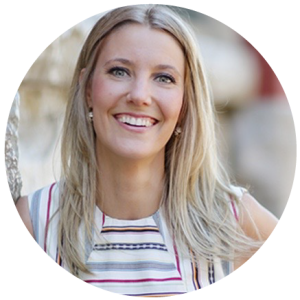 Kaela Scott is a Registered Clinical Counsellor who specializes in Eating Disorders. She runs her own private practice and works with the Looking Glass Foundation in both their summer camp and their Hand In Hand Program. She has been passionate about working with eating disorders since freeing herself from her own struggle and realizing what it is like to be happy and well. When she isn’t working, you can find Kaela either cozying up with a cup of tea and her friends or up in the mountains going for a hike.
Kaela Scott is a Registered Clinical Counsellor who specializes in Eating Disorders. She runs her own private practice and works with the Looking Glass Foundation in both their summer camp and their Hand In Hand Program. She has been passionate about working with eating disorders since freeing herself from her own struggle and realizing what it is like to be happy and well. When she isn’t working, you can find Kaela either cozying up with a cup of tea and her friends or up in the mountains going for a hike.
By Maja Kostanski
June 2nd will mark the third annual World Eating Disorders Day, an initiative that aims to expand global awareness of eating disorders as genetically linked, treatable illnesses that can affect anyone. The theme for this year is #WeDoAct2BreakStigma, urging individuals and communities to take steps to break the stigma that surrounds eating disorders. As statistics show, there is still a great need to raise awareness about eating disorders in our society¹:
So what does breaking the stigma look like? There are many ways to decrease stigma, such as sharing correct information and initiating genuine conversations with family, friends and professionals about what eating disorders are and what they are not. This topic was explored in our Something’s Gotta Give (SGG) Short Film Series, particularly in Episode 2: Bust the Myths and Episode 5: Re-think ED’s within Mental Health.
 From my personal experience, one of the challenges I came across during my eating disorder recovery was the dismissive way that others would tell me I look fine, or I seem fine. Eating disorders are not discernable by the way someone looks – sufferers come in all body shapes. I suffered from binge eating and an exercise addiction, and by meticulously balancing food and exercise I was able to maintain a healthy weight, which made it appear externally that I was fine. I was not fine. On the inside, I was in agony; and I was flat out exhausted both physically, and even more so mentally. When I finally found the courage to tell my friends and family that I was seeking help, I was often met with comments such as “But you look so fit!” or “You’re always outside hiking and running, you seem fine”.
From my personal experience, one of the challenges I came across during my eating disorder recovery was the dismissive way that others would tell me I look fine, or I seem fine. Eating disorders are not discernable by the way someone looks – sufferers come in all body shapes. I suffered from binge eating and an exercise addiction, and by meticulously balancing food and exercise I was able to maintain a healthy weight, which made it appear externally that I was fine. I was not fine. On the inside, I was in agony; and I was flat out exhausted both physically, and even more so mentally. When I finally found the courage to tell my friends and family that I was seeking help, I was often met with comments such as “But you look so fit!” or “You’re always outside hiking and running, you seem fine”.
This is my story, and there are thousands of stories similar to mine. So yes, stigmas absolutely do exist and there is a lot of work to be done on educating society about the reality of eating disorders. But that’s not enough.
[dt_quote type="pullquote" layout="right" font_size="big" animation="none" size="1"]As I delve deeper into statistics, and the complexity of eating disorders and the systems around them, and with some guidance and insight from the Looking Glass team, I am quickly realizing that we – as individuals, as institutions, as a society - need to do more.[/dt_quote]
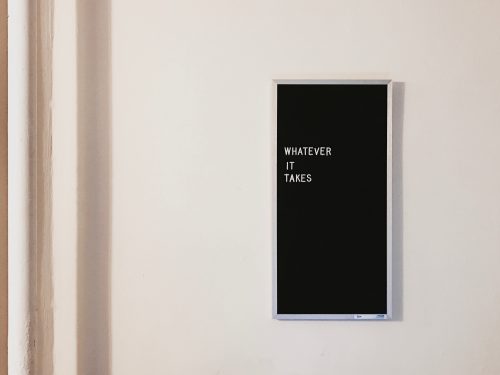 Admittedly, when I first started working for Looking Glass (just a week ago!), I had it in my mind that raising awareness and breaking stigma was the key to tackling eating disorders. As I delve deeper into statistics, and the complexity of eating disorders and the systems around them, and with some guidance and insight from the Looking Glass team, I am quickly realizing that we – as individuals, as institutions, as a society - need to do more. Yes, we need to change the way we think, but more importantly we need to change how we actually go about fighting and eradicating this disease. So let’s break stigma, and then break barriers – barriers to accessing effective treatment, barriers around government inaction, barriers to insurance coverage... the list goes on.
Admittedly, when I first started working for Looking Glass (just a week ago!), I had it in my mind that raising awareness and breaking stigma was the key to tackling eating disorders. As I delve deeper into statistics, and the complexity of eating disorders and the systems around them, and with some guidance and insight from the Looking Glass team, I am quickly realizing that we – as individuals, as institutions, as a society - need to do more. Yes, we need to change the way we think, but more importantly we need to change how we actually go about fighting and eradicating this disease. So let’s break stigma, and then break barriers – barriers to accessing effective treatment, barriers around government inaction, barriers to insurance coverage... the list goes on.
So what does breaking barriers look like? From an individual perspective, there are countless ways to take action: from speaking up about companies that use misleading advertising messages and images, to urging the government to pay attention to eating disorders through writing letters and lobbying policy-makers to increase funding for ED research, prevention and treatment.
From a healthcare perspective, we need to re-think ED programming and tackle the issue of waitlists and financial barriers to treatment. In addition to early prevention programming in our schools and communities, and the availability of better information resources generally, we need to ensure there are enough support and treatment programs for those who suffer. Education around eating disorders for healthcare professionals needs to increase, and burnout and lack of training needs to be addressed.
From a society perspective, we need to detoxify our culture and the deeply ingrained values that obsess about body image and vanity. Our value as people, regardless of gender, has become linked with how young, thin, and attractive we are. These values affect the way we view and talk not only about our own and other’s bodies, but also our own and other’s worth. This has to change.
These are just a few of the many ways we can take action. The SGG Short Film Series addresses many hard-hitting issues and what can be done, and I encourage you to watch them all.
What I am learning is that the long-term vision is what we need to fight for and something we cannot lose sight of. The short-term vision is to change the way society understands eating disorders. The long-term vision is to live in a society that leaves no space for eating disorders to manifest themselves in the first place.
References
¹ IPSOS Reid Poll of 1005 Canadians in November 2014, conducted for NEDIC

Maja is the Communications Coordinator at the Looking Glass Foundation, and holds a Bachelor of Science in Food, Nutrition and Health from the University of British Columbia and a Digital Marketing Certificate from Simon Fraser University. When she isn't working, you can find her mountain biking, hiking or running in the trails with her energetic dog.
By Grace Davies
In her hopeful and inspiring Mother's Day poem about recovery, guest blogger Grace Davies reminds us to relish in all of the important steps we've taken along the way, and that true recovery is possible for all of us: "There are many of us who walked the path before you and we will guide the way. / Keep going, keep dreaming and most importantly: keep living."
Mother’s Day Brunch (BUFFET) - A Celebration of Recovery
It’s a mixture of joy and disbelief
A strange sensation - uncharted territory.
REAL Recovery.
All of a sudden, I arrived and I didn’t even know how I got here.
Previously, in my wildest dreams I could not have known this to exist.
Suddenly, I'm here.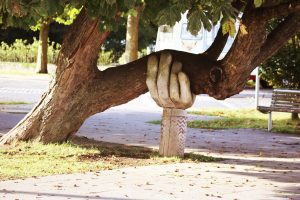
I enjoy freedom around food,
paired with a deep inner trust.
My world feels safe and secure.
I know how to set boundaries and cope with challenges.
I know how to relax
It all surmounts to joy.
Suddenly I’m living my life.
It seems so funny to look back on each stage.
The therapies, group support, individual support, medical support, meal plans, letting go of meal plans, volunteering, activism - bleeding hearts.
Absolutely amazing community support.
After it all, I’m celebrating success!
The whole process was a symphony of collaboration -
Teams of helpful people at my side
And on my own part, the deep self-honesty and will to keep going.
A year and a half ago someone told me that intuitive eating was possible.
I thought it was crazy - for “normal” people maybe but not me.
And after a long period of trial and error-
Today I’m celebrating tuning into my cravings,
nourishing my body and soul with just the right foods for me.
Suddenly I’m looking in the mirror with nice things to say.
Suddenly I’m relaxed around food, friends and family -
even when they happen at the very same time! (WOW)
This is a message for anyone who wants recovery but isn’t sure if it’s possible.
I now know what it tastes like, and I promise it’s real.
This is a message for anyone who wants recovery but isn’t sure if it’s possible.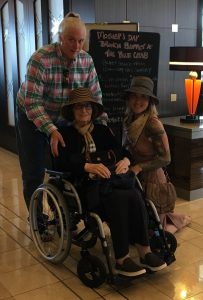
I now know what it tastes like, and I promise it’s real.
I’ve been where you are, I know the despair.
One day at a time my dear, you can do it.
There are many of us who walked the path before you and we will guide the way.
Keep going, keep dreaming and most importantly: keep living.
Through the action of pursuing your own life suddenly the ED will disappear.
Without force, without fight all of a sudden you will notice it’s gone.
Your life, your joy - your passion is most important.
Stay true to yourself each step of the way.
Someday you might find yourself in my shoes.
Although I do like to take them off. (see me in the photo with my shoes off!)
Someday you too will be free.
Photo 1 by Neil Thomas on Unsplash
Photo 2: Grace and family at Mother's Day Brunch

Grace Davies is recovered from orthorexia and binge eating. She spends most of her time teaching and practicing yoga in Victoria and or hanging out in bare-feet, somewhere on a gulf island. She also writes and meditates, and you can find more info at www.gracedavies.ca
By Alicia Putinski
**Trigger Warning: This article discusses fitness and exercise in the context of recovery from an eating disorder. Please practice mindfulness and self-care if these topics are triggering to you.**
To be in our bodies is a beautiful feeling. Experiencing the multiple layers of ourselves using the information our bodies provide is a wonderful way to form a deeper connection to ourselves and the world around us. I truly believe health is a mind-body connection and as we feel into the ways our bodies communicate with us, we are able to make choices that honour our unique needs. This experience is called the feeling of "embodiment."
I am an orthorexia-recovered life coach and holistic personal trainer. Like many in the health and fitness industry, I developed the “clean eating” eating disorder. I was so obsessed with clean eating that it became unhealthy and self-punishing. Although there are many triggers in the health and fitness industry, I will always stress that eating disorders are not about food at the root, and addressing the whole person is crucial in recovery.
One of the most valuable lessons I learned healing from my eating disorder and body dysmorphia was how to become embodied.
Embodiment is the representation or expression of something in a tangible or visible form. I feel it a nd embrace it as the freedom to be in my body, feeling into my body, listening to it, and replying with self-care — whether this be having an exciting spontaneous day and living in the moment, or having a challenging day, taking a time out, and showing myself compassion. We can feel embodied through movement or in stillness. Our mind-body connection is fascinating and a wise communicator. Embodiment allows us to receive signals from our body on a physical and emotional level, and make choices that will best honour our needs.
nd embrace it as the freedom to be in my body, feeling into my body, listening to it, and replying with self-care — whether this be having an exciting spontaneous day and living in the moment, or having a challenging day, taking a time out, and showing myself compassion. We can feel embodied through movement or in stillness. Our mind-body connection is fascinating and a wise communicator. Embodiment allows us to receive signals from our body on a physical and emotional level, and make choices that will best honour our needs.
Becoming embodied in general is a process that takes practice, so be kind to yourself along the way. If you’re hoping to integrate a healthy movement or fitness practice into your recovery, I have some recommendations to help you get started:
Progress takes time, both in healing and physical fitness. There have been many times in my own journey of recovering from an eating disorder, as well as beyond recovery, where I dialed down my exercise in order to prioritize other areas of my health. It’s more than okay to change focus and priorities. Bodies change at different phases of our lives and so do our physical abilities. As a life coach, I specialize in helping athletes and fitness enthusiasts make peace with food and their bodies. In this process, we spend a lot of time removing the identity they’ve created in fitness. Fitness can be a lot of fun when it’s executed from a place of self-love. However, it is simply one area of our lives and there is so much more to us as human beings than fitness!
Photo by Robert Collins on Unsplash
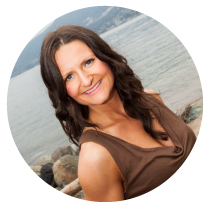 Alicia Putinski is an orthorexia-recovered life coach and the founder of Weightless Body Confidence Coaching. She is also a personal trainer specializing in strength and functional movement. To learn more about her work, visit youareweightless.com
Alicia Putinski is an orthorexia-recovered life coach and the founder of Weightless Body Confidence Coaching. She is also a personal trainer specializing in strength and functional movement. To learn more about her work, visit youareweightless.com
By Katalina Bernards
*Trigger warning: This article makes general references to the #metoo movement, sexual harassment, and misogyny
Every story of recovery is as unique as the person it belongs to. We have all faced moments of truth, or had valuable lessons resonate deep within ourselves, at different times and for different reasons. For me, I had to experience the process of un-learning before I could really begin to understand myself, and deconstruct the stubborn ideas that had made me sick in the first place. When the #metoo movement started to take hold in 2016, I began to reflect deeply on the problems of misogyny and body objectification in the context of my eating disorder.
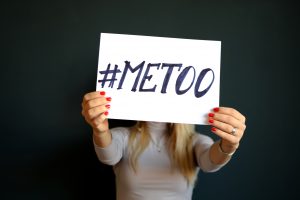 When I was thirteen years old, my friend Debra and I had to perform a skit in French class. We were assigned to play celebrities in a made-up Francophone television commercial, and we chose to be Cover Girls: Debra played Cindy Crawford, and I played Nikki Taylor. When we "introduced" our celebrity selves to the class, Debra's "Je suis Cindy Crawford," was greeted with whistles and catcalls from the boys in the class, while my "Et je suis Nikki Taylor!" received a stifled snort and the proverbial chirping of crickets.
When I was thirteen years old, my friend Debra and I had to perform a skit in French class. We were assigned to play celebrities in a made-up Francophone television commercial, and we chose to be Cover Girls: Debra played Cindy Crawford, and I played Nikki Taylor. When we "introduced" our celebrity selves to the class, Debra's "Je suis Cindy Crawford," was greeted with whistles and catcalls from the boys in the class, while my "Et je suis Nikki Taylor!" received a stifled snort and the proverbial chirping of crickets.
And that was how I found out that I wasn't pretty. It was mortifying. But then it got even worse: my teacher, in an attempt to repair my freshly shattered self-image, stopped our skit and told off the rest of the class for being insensitive. She told us to begin the skit again, and that this time she expected the class to show their full support for both of us. So we did, and this time I got a consolation round of artificially enthusiastic whistles and catcalls from the boys. The teacher gave a satisfied little nod; problem solved.
But it wasn’t solved. Not by a long shot.
Not only did my teacher fail to make me feel better about myself, but she failed to grasp the real problem in the room. The message I got that day was that I didn't have any value unless I was being whistled at and catcalled by men. She didn't tell off the class for degrading Debra by whistling at her, she told them off for degrading me by NOT whistling at me. We were two little French objects that day, and it was the most impactful and long-lasting lesson I got from that class. It was the first time I was consciously aware of being undesirable – so I changed myself. I acquired an increasingly risqué sense of style, multitudes of makeup and hair products, and an eating disorder that would not leave my side for fourteen years.
I. Was. Thirteen.
The other major lesson I took away from that French class was that my value should be judged in comparison to other women. So I learned to view girls and women as potential threats that could undermine my perceived value. I refused to nurture female friendships, and I wouldn’t even begin to realize what this had cost me until years later; I had unwittingly internalized the deep-seated, nuanced misogyny of my culture, and I couldn’t even recognize it. But over time, in the company of strong, courageous, vulnerable warrior women and our allies, I finally learned to stop hating myself. I learned to stop accepting sexual harassment and assault, to reject the idea that my body was for other people, and I learned to walk free of the shadow of my eating disorder.
In the company of strong, courageous, vulnerable warrior women and our allies, I finally learned to stop hating myself.
Today, I am recovered. I am more resilient and comfortable in my own space, my own skin, and my own being than I have ever been. But it took me a very long time to get here, and it was a path of great and terrible resistance at times. Un-learning the damaging messages I had received throughout my life took time and a conscious effort.
When I look at our world today in the rise of the #metoo moment, and witness the growing legions of people who are learning to accept that we aren’t perfect, and that all of us may yet have a role to play in changing the ethos of a sick culture, I am reminded of that same road to recovery. There are no shortcuts to getting there, no skipping over the dark and brutal chapters of our minds. Recovery requires truth, and accessing that truth can be painful – especially if we have to confront our own core beliefs to get at that truth.
Sometimes, the truth is not comfortable, beautiful, or funny. Sometimes a moment’s truth will catch you completely off guard by stripping down and standing naked in front of you – and instead of dancing or laughing or playing your song, it cripples you with its pure and unapologetic honesty.

These moments of truth are like the gargoyles of the human condition: grotesquely beautiful guardians of crumbling stone that protect humanity from its ego, and make the taste of laughter sweet. They are necessary, and they are here to help us heal. But these moments do not always come easily, or without pain. It may be tempting to become cynical, for your own protection, but don't be fooled – this #metoo moment is a time of hope, and reclamation of the sacred parts of self, and body, and beauty, and identity, that have been twisted and gnarled into profane ideologies and absurd expectations.
Confronting my own biases and shame around my identity was, at times, an uncomfortable and ugly experience. But through it, I arrived at my recovery. There is no question that it was worth it – the payoff is incomparable! My life is my own, and I manage the ups and downs by approaching myself with love and respect. As difficult as the road to recovery can be, hold on to it. There is a world of laughter and beauty, compassion and acceptance, just beyond the next turn.
Photo 1 by Mihai Surdu on Unsplash
Photo 2 by Pedro Lastra on Unsplash

Katalina is the Volunteer Manager at the Looking Glass Foundation, and holds a degree in Psychology from Simon Fraser University. She loves live music, theatre, writing, and singing when no one is listening.